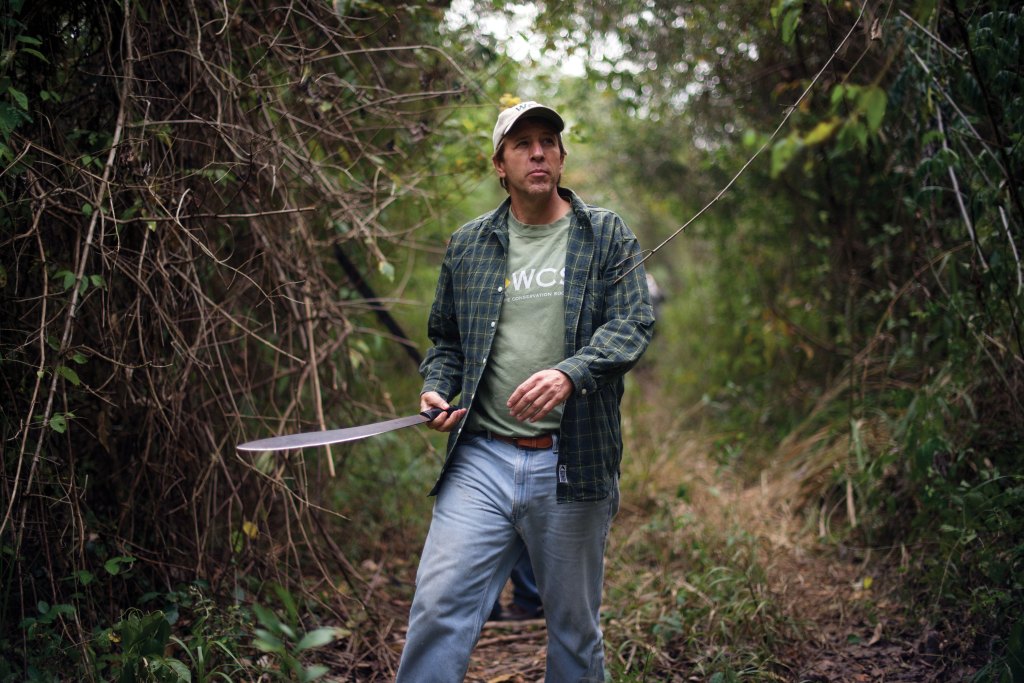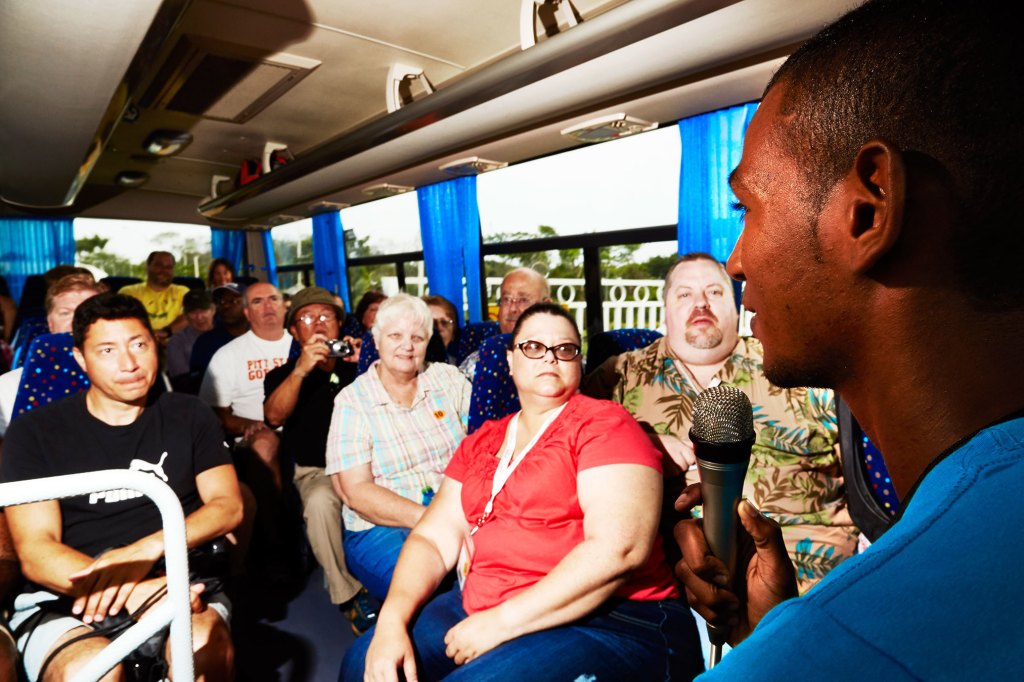BELIZE CITY, Belize — The Antillean manatees of Belize just had the best year of their lives.
The global population of the slow-moving marine mammals, affectionately nicknamed sea cows, has declined dramatically in recent years. That is, until Covid-19 hit. The pandemic put a halt to one of the most dangerous threats facing the manatee—the cruise ship industry.
Videos by VICE
But not only is tourism restarting in Belize, the industry has big plans for the small Central American nation. One massive cruise ship port is under construction close to an important manatee habitat, and two other cruise port projects are awaiting government approval.
Environmental activists warn the danger to the manatee could be irreversible.
“Belize is the last stronghold of the Antillean manatee in the world. If we don’t do enough to save the species, it will likely go extinct,” said Jamal Galves, a prominent conservationist known throughout Belize as “The Manatee Man.”

Galves slowly rode his boat around the lush mangroves where the manatee populations quietly graze the seagrass, on the lookout for a surfacing manatee snout or the shadow of their large bodies swimming gracefully nearby.
Manatee deaths were more than halved last year, from nearly 50 in 2019 to fewer than 20 in 2020, he said, because the cruise ship shutdown removed the boats that shuttle tourists to the shore.
“A majority of the collisions happen in shallow water where manatees tend to feed and hang out,” Galves said. “But if you’re in the water some three feet deep and the engine goes down two feet deep, the manatee has no space between the ocean floor and the boat to get away.”
“Manatee death rates increase every year. Just like tourism numbers go up, the manatee’s death rate follows behind.”
Galves fell in love with the gentle creatures after he began to volunteer with several U.S. conservationists working in Belize when he was just 11 years old. He made his lifelong goal to save the manatee from extinction and two decades later, he’s the Belize program director of a conservation and research institute, the Clearwater Marine Aquarium, founded by one of those scientists. His face appears on the aquarium’s billboards around the country promoting manatee awareness.
But just like the manatees caught between the ocean floor and a boat motor, Belize is stuck between a rock and a hard place.
The country is known for its pristine shallow waters, the world’s second-largest barrier reef, and the diversity of marine life they support. But with that beauty has come a dangerous reliance on tourism, which represents over 40 percent of Belize’s GDP. So while tourists flock to the country to enjoy its renowned ecosystem, they also generate the biggest threat to survival.
The dilemma is clear to Belizean Prime Minister Johnny Briceño who entered office in November 2020 facing a long list of problems, beginning with a struggling economy that was further decimated by the coronavirus pandemic.
“Unfortunately for Belize, we were already in a recession even before COVID. Our unemployment rate has gone up to over 30 percent and underemployment also has gone up considerably,” Briceño told VICE World News.
To spur the economy he planned to relaunch the tourism industry and create new investment opportunities to generate more jobs. The most visible tourism project is a cruise port off the coast of Belize City, near one of the principal manatee habitats in the country.
“I understand the importance and need to balance between development and the environment. People come to visit us because of our natural state. And so we need to ensure that we protect that,” said Briceño.
“But at the same time, looking at the flip side of the coin, there are some environmentalists that would want to leave everything as it is and we have to find that balance.”
Briceño previously served as Belize’s Minister of Natural Resources and the Environment in the late 90s and early 2000s and he said that “we’re going to err on the side of caution to protect the environment, that’s our commitment.”
“But it does not mean that we’re not going to try to attract investments in companies into the tourism sector,” said Briceño. “That is something that is absolutely necessary and the responsibility of any government to ensure that we can create opportunities for people.”
The port project broke ground in February 2019 about 10 minutes off the coast of Belize City—the country’s most populous city and the gateway to the country’s vast tourism industry.
Bention Feinstein, an executive of the family-owned development company, told VICE World News that the project, the Stake Bank Cruise Port, had a “very minimal environmental impact.”

The Belize-based Feinstein Group is building the port on a small island, Stake Bank, which has been significantly expanded in size through dredging—the process of dragging the sea floor for mud, weeds, and coral that is then deposited on the island. Feinstein said that only dead coral was removed and “100 percent of it goes on the island.”
Along with four cruise ship docks, the company intends to fill the island with bars, shops, and pools, and provide boats to carry tourists back and forth to the mainland. Feinstein said the completed project would create 3 to 4,000 indirect jobs with a trickle-down effect to about 10,000 households.
“With this cruise port, we don’t need anything else in the country,” he said. “This is perfect for Belize. We’re not overdoing it. Now, there’s a couple other cruise ports on the table. That’s a disaster,” said Feinstein.
Belize currently has two other similar cruise ports being considered for development but they haven’t yet received the go-ahead from the government to move forward on construction. Stake Bank on the other hand is quite far along and is projected to open in the first quarter of 2022.
Janelle Chanona, the vice president of the conservation organization Oceana in Belize, said she feared that the rush to revitalize tourism could lead to quick approval of haphazard development projects that could endanger the manatees and other marine life. “The onus is on the government to make sure that as it’s developing, it’s putting the environmental concerns or mitigations first,” said Chanona.
“It can’t be that in developing your tourism product, you’re destroying the heart of the tourism product, which is these charismatic species in their natural environment and this experience that people are able to enjoy when they’re in Belize, right?”

Galves, the Manatee Man, sat in his small boat in the lush mangroves keeping an eye out for mud moving in the water, a sign that his underwater friends were nearby. While he hoped that Belize would be a “leader” in protecting its waters, he also acknowledged that “cruise tourism is critical for Belize.”
“It contributes significantly to our economy. It pays a lot of people, it helps their kids, for people to put food on their table. So I feel for them,” said Galves.
“But in my opinion, if the ecosystem collapses, the economy will die much faster than COVID killed it.”
Ben Solomon, Maeva Bambuck, Zach Caldwell, and Jose A. Sanchez contributed to this report.








